Dubai is a city that is known for being very friendly for the business, that means a huge number of opportunities to tap for small businesses. For more, not just anything else but almost everything will make an enterprise successful in its competitive environment. Entrepreneurs have to find excellent and innovative, practical, and strategic ways of growing their business sustainably. In fact, the following article discusses 20 great things that can boost any small business into receiving a better market share, much revenue generation and building a strong customer base in Dubai. Each of these was referenced by a real-world example from Dubai’s booming business ecosystem.
1. Using Free Zones for Fast Business Expansion
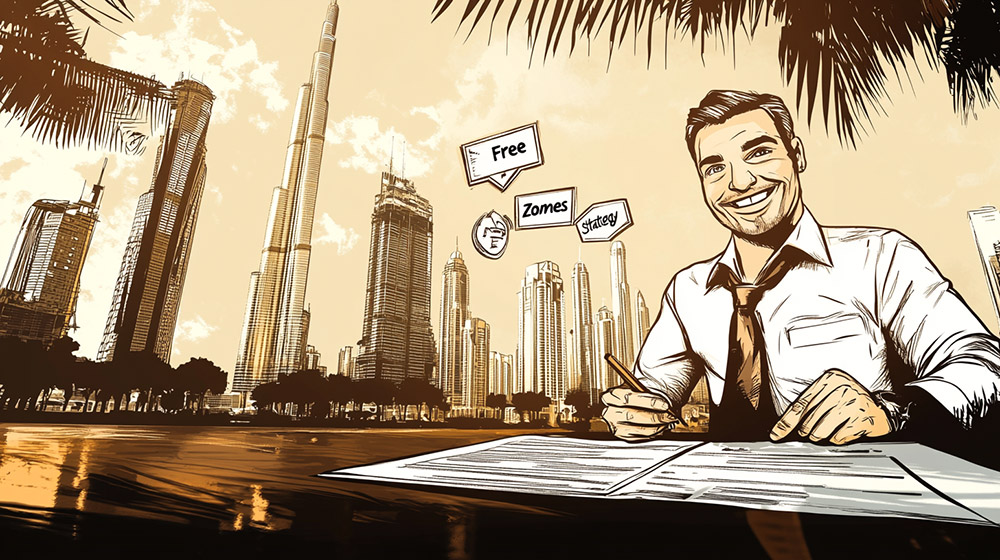
One of the most effective ways to grow a small business in Dubai is by establishing in a free zone. Dubai has more than 30 free zones, each of which focuses on a particular type of industry, offers 100% foreign ownership, tax-free, and quite easy registration of the company. Choosing the best free zone according to your business activity can make drastic changes in the way you expand your business.
As an example, Dubai CommerCity, the free zone for e-commerce, gives companies logistics support, which makes an easier growth opportunity in the online presence of companies. There is a similar case: DMCC (Dubai Multi Commodities Centre) which is specialized in trade and attracts thousands of entrepreneurs who wish to establish business in this part of the world.
Among the successful cases is Melltoo, a second-hand e-commerce marketplace that used to stretch its operations through free zone incentives into the Saudi market. With the proper selection of the free zone for the business, efficiency is attained in operation and also with access to more clientele across borders.
2. Business Hacking with “Piggyback” Strategies
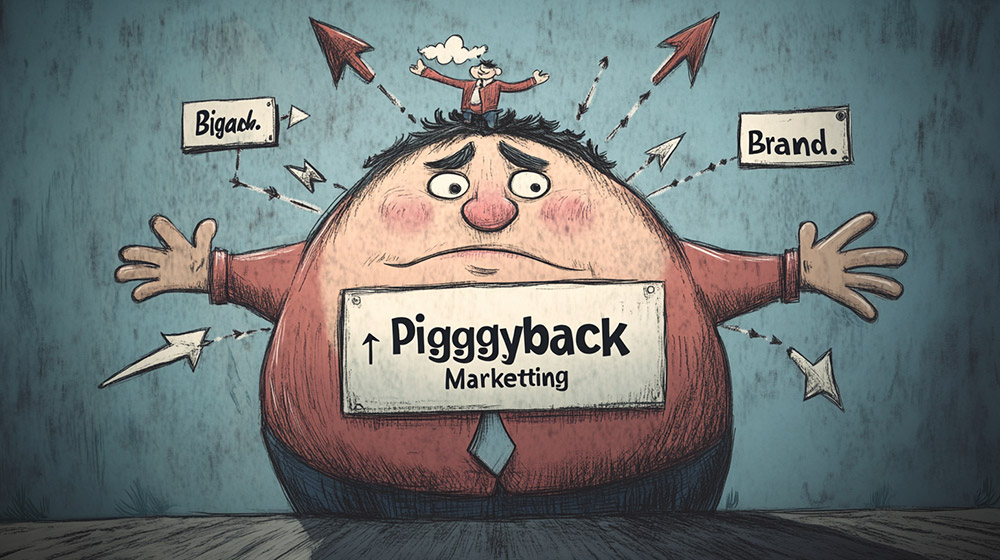
The simplest ways for small businesses to gain visibility in Dubai is to align themselves with established brands and exploit their respective audience and credibility. The typical method would have been spending heavily on advertisement. The businesses can find a way of associating themselves with monument-market leaders through organizing a joint event or including their services in famous platforms just to announce their visibility.
As an example, Washmen- Online laundry service of Dubai- partnered with hotels and co-working spaces for their laundry pick up and drop off services. This access to high-end customers wouldn’t be needed after such a huge marketing investment by such companies. Likewise, it promotes cross-promoting brands that aren’t direct competitors of one another-a gym might partner with a health nutrition company to offer discounts exclusively to their affiliated customers, so everyone benefits.
3. Local Marketing in Dubai: Expanding Horizons
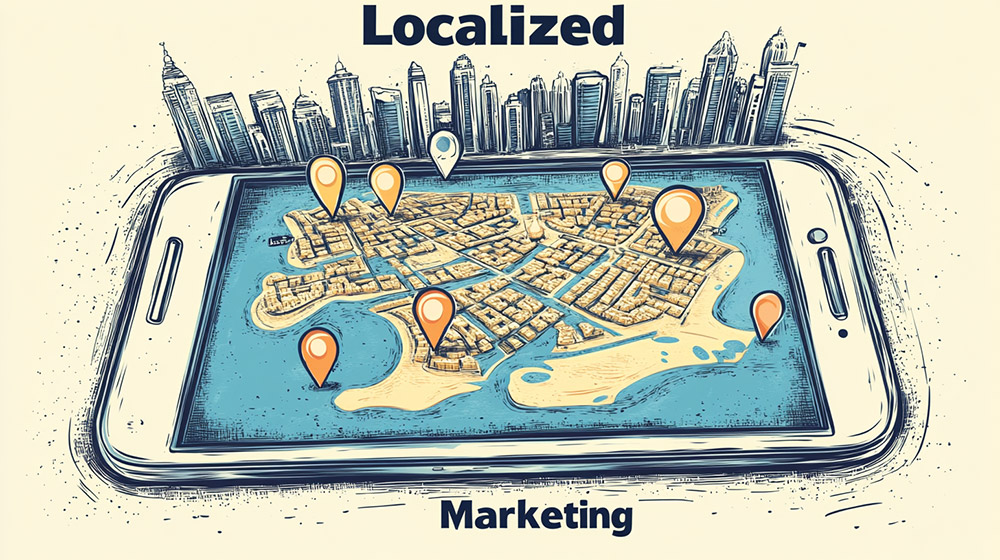
Digital marketing is a make-or-break tool in the business world, but by hyper-localizing, you will reach your desired audience. Hence, in Dubai brands ought to optimize their marketing campaigns by targeting specific locations and accommodating multilingual audiences.
Take NRTC Fresh as an example. NRTC Fresh is a fresh fruit and vegetable delivery service that managed to target select Arabic-speaking Emirati neighborhoods through geo-targeted ads in Arabic and was able to increase sales by an impressive 40%. Such efforts include Google My Business, SEO done in both Arabic and English, and targeted social media ads like Instagram, Snapchat, and TikTok to help them reach local customers efficiently.
4. Building a Strong Referral & Loyalty Program

Word-of-mouth is still considered the strongest marketing tool in Dubai, and a solid referral and loyalty program would accelerate the growth of small businesses. Businesses have to make tiered rewards, which can include discounts, free products, or perks exclusive to repeat customers and referral sponsors.
The best example of this is The ENTERTAINER App. It has changed the game of loyalty in Dubai by providing “Buy 1 Get 1 Free” deals across the domains of food & beverage, leisure and lifestyle. Small businesses can create similar programs through mobile applications, WhatsApp groups, or exclusive memberships in order to keep their customers engaged.
5. Selling on Best Online Marketplaces in UAE
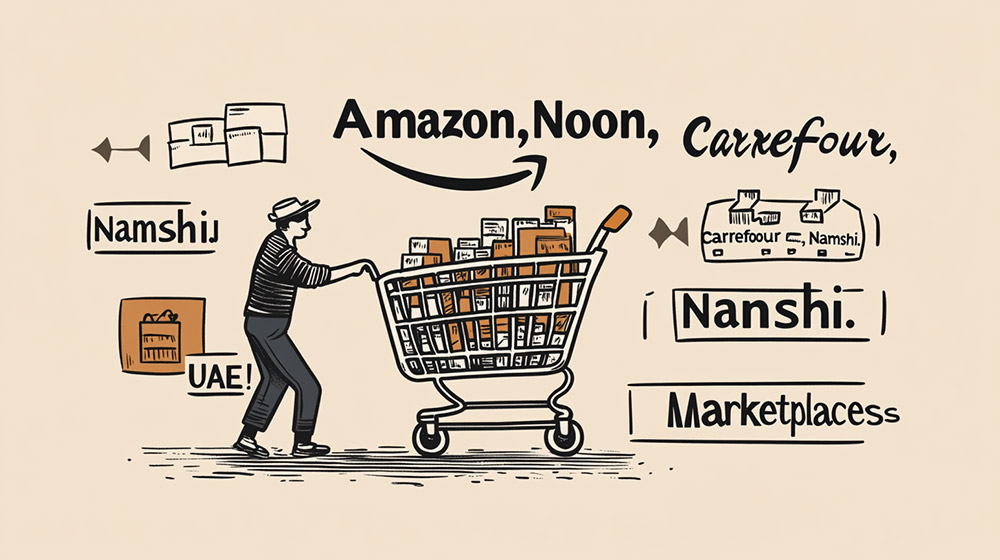
Instead of building their audience from scratch, small businesses can quickly scale themselves by listing their products on the e-commerce platforms of Noon, Amazon-UAE, Carrefour, and Namshi. These platforms have an existing huge customer base and provide a ready-made audience for new businesses.
Example: A luxury perfume startup in Dubai leveraged Amazon Prime UAE to drive the orders from 5 to 100 orders a day, using the platform for exposure and logistics. E-commerce is thriving in the UAE, and small businesses would do well to cater to it with quick delivery and competitive prices, without heavy investment from the beginning.
6. Hacks for the Offline Growth of Mall Pop-Ups & Kiosks

Dubai malls are among the most populated malls worldwide, and thus pop-ups or kiosks here create a great opportunity for high footfall generation. A small business can thus start a temporary retail space in the high-traffic areas of Dubai Mall, Mall of the Emirates, or Mirdif City Centre, to test new products and build awareness for the brand itself.
Project Chaiwala, a small tea brand, was a mall pop-up that quickly gained recognition and prominence, enabling it to open several permanent locations across the UAE. This approach will grant businesses a chance to test concepts before opening fully-fledged retail stores.
7. WhatsApp Business Mastery Selling and service support

More than 80% of Dubai residents access WhatsApp at least once per day. This feature is instrumental in small businesses improving service delivery and increasing sales by that applicable modern way-the WhatsApp Business. Automated replies, quick catalogues, and bots are some of the features that would enable companies to operate their businesses smartly.
Just Mop is actually a Dubai home services business that offers a platform for customer bookings through WhatsApp. On average, 60% of its business closes through chat. Small businesses should also create exclusive VIP groups for loyal customers with special discounts or benefits.
8. Micro-Influencing: For Quick Brand Awareness
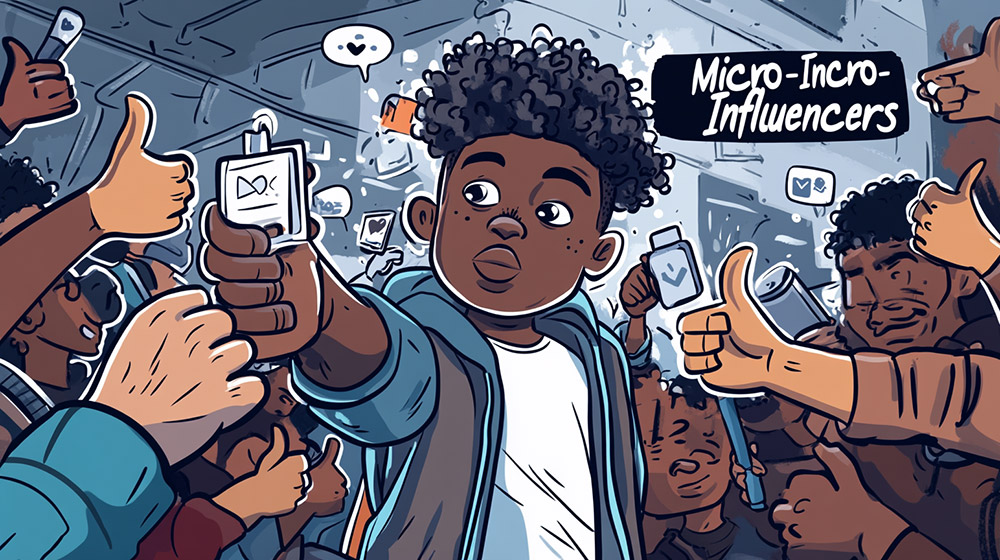
Celebrities are expensive to pay to endorse your brand so most of these micro- influencers (people with 10K-50K followers) have created a cheaper and more engaging partnership. One could source targeted help by using local food, beauty, fitness, and fashion influencers because an average Dubaian spends the major part of his day on social media.
Wild & The Moon, a vegan restaurant, promoted a few of its products through fitness influencers, and immediately they were sold out. Instead of putting all the money for celebrities’ endorsements into a more niche-followed influencer, small businesses should use better marketing strategies.
9. Tapping into High-Traffic Tourism Market Dubai
Over 16 million people come to Dubai every year. All these tourists present solid opportunities for small businesses to get revenue because they can list services on tourism platforms such as GetYourGuide, Viator, and Airbnb Experiences.
Desert safari tour companies sign contracts with luxury hotels to bring up high-profile tourists and always get bookings throughout the year. Food experience, adventure tour, or retail service, everyone’s thinking about marketing to a high expenditure and transient visitor in Dubai.
10. Subscription Models for Continuous Revenue

Businesses need subscriptions to ensure regular revenue collection and retention of customers. Food, beauty, fitness, and home services are some of the small business categories that can implement this to develop loyal customers.
Fitlab introduced bespoke fitness subscriptions in the Dubai gym, resulting in higher retention figures. From monthly meal plans and beauty boxes to premium delivery, businesses can establish predictable revenue streams through subscriptions.
11. Local Business Networking & Chamber Events

Building strong relations is one of the best ways to expand a business in Dubai. The city never runs short of hosting networking events focused on connecting entrepreneurs with potential partners, investors, and customers.
Being members of the Dubai Chamber of Commerce and SME networking groups opens up many doors to new business opportunities. These organizations provide access to exclusive business events, mentorship programs, and accelerator initiatives. They give small businesses exposure to flagship exposition events like Gitex, Dubai Business Forum, and STEP Conference to have their offerings presented, learn from the industry leaders, and scout potential investors.
Business referrals are another solid way to connect with others. Networking and forming partnerships with other businesses for referrals can become a basis of growth for both parties. For instance, a Dubai-based fintech startup was able to garner venture capital funding through networking at a Dubai Chamber SME event. Inviting small businesses into these networks and engaging with the right people can propel their growth.
Dubai Fashion Week (DFW) stands out as a textbook example of strategic networking and event participation. By shifting its dates to early September, DFW made itself a show that would happen before the major global fashion weeks, drawing both regional and international retailers. This strategy thus wildly upgraded the interconnections between local designers and global buyers, giving participating brands visibility and growth.
12. Smart Pricing Tactics: Buy Now, Pay Later Services
Pricing has always had a say in the “yes” on customer purchase decisions. Introducing flexible payment options, such as Buy Now, Pay Later (BNPL), can act as a great sales enhancer. Most businesses in Dubai offer BNPL services such as Tabby and Postpay, whereby consumers can split payments into interest-free installments.
The strategy suits especially well companies selling high-ticket items with electronic gadgets, luxurious fashion, and furniture. BNPL options must be advertised on websites, running ads, and checkout pages to help reduce purchase hesitation and trigger impulses.
Luxury retailers in Dubai Mall provide an exemplary reference for this strategy. After Tabby was introduced, these stores saw a 30% increase in sales, as their products became easier for customers to purchase.
Visa’s partnership with Affirm to introduce a card with debit capabilities and BNPL in the UAE points to the increasing importance attached to flexible payments. With this initiative tailored to meet the growing demand for payment flexibility for the consumers, purchases will become easier and, with that, a potential rise in sales for businesses taking up this service.
13. AI Chatbots & Automation in Lead Generation

The age of automation has brought about another paradigm in customer engagement and lead generation. With the help of AI chatbots like ManyChat and WhatsApp Business AI, businesses can have instant interactions with clients, respond to inquiries, and automatically capture leads.
Automated follow-up emails and SMS campaigns nurture leads on time so that conversion opportunities grow. Customer engagement tracked through a CRM enables personalization and individual follow-ups, confirming customer care.
For example, an online coaching business based in Dubai has put in use AI-powered chatbots in WhatsApp to answer client inquiries and lead them through the sales funnel. They achieved 50% higher conversion, an instance of AI-driven engagement working wonders.
14. Building A Mobile App for Convenience & Engagement
In the online world today, a dedicated application might give one’s business an edge. A great application enhances customer experience with fluid navigation, in-app payments, and loyalty programs.
Push notifications serve as a great tool in building impulse for exclusive all-offers and limited-time discounts. Moreover, gamification features in the app can keep customers entertained and entice repeat purchases with levels, badges, and special rewards.
Another case of success in Dubai is Kibsons-an online grocery delivery app. It increased its daily orders threefold by sticking to mobile usability and retention strategies, showcasing the strength of a mobile-first approach.
15. Secret Growth Hack: Running Free Educational Workshops
Free educational workshops are unique in attracting potential customers and building brand authority. The imparting of valuable industry knowledge allows business-to-client relations to grow into scenarios where clients trust businesses as experts in their respective fields.
LinkedIn and Meetup are good platforms to market these events for a targeted audience. If the attendees appreciate what the workshop has to offer, the companies can sell exclusive post-event discounts or special offers and turn them into paying customers.
A digital marketing agency in Dubai organized free workshop sessions to teach Instagram growth at co-working facilities. This led to acquiring over 70 high-ticket clients, demonstrating that sharing knowledge can lead to business development.
16. Premium Customer Service as a Growth Strategy
Quality customer service is the focal point of distinction within Dubai’s concerned market. Businesses that go that extra mile for customer delight can be sure to gain loyalty and reputation by word of mouth.
Training their staff in providing VIP treatment such as using customers’ names, providing little supplements, and the likes, should surely go along their way as memorable experiences. The satisfaction enjoyed by customers, owing to white-glove delivery services, further enhances the luxury touch of a high-end business.
For example, Blacklane, a luxury chauffeured transport service in Dubai, thrives on its luxury 5-star experience offerings such as complimentary bottled water, free Wi-Fi, and professional drivers. It is the attention to each and every detail that helps in creating brand loyal customers.
17. Guerrilla Marketing in Dubai’s Public Spaces

Guerrilla Marketing is an unconventional and cost-effective medium that plays a role in terms of being visible. A business may creatively alter the Dubai street scape and catch the attention of the audience in different ways.
Say there are QR codes put on public advertising installations where scanning takes customers to flash sales or exclusive deals linked to the scanning ads. Flash mobs and street performances, wagged on behind the product, have created a great buzz and brought viral visibility to their product. The sponsorship of art installations or branding of graffiti walls further reinforces their brand directly or indirectly.
For example, a sneaker brand in Dubai has been using QR codes on Metro station ads that lead to a TikTok challenge in which users started doing it, and viral sharing ensued. They sought immense and wide-reaching user engagement with their brand.
On the point related to the above, you will see Lila Taqueria-Mexican Restaurant taking some inspiration from the localized dining culture trending here and then a focus on the community. In doing so, they were visible, attracting many customer variations by means of the various events and marketing whenever they received word-of-mouth for the experience.
18. Building Strategic Partnerships with Complementary Brands
Putting the attention on partnerships with like-minded brands can unlock a company’s potential to connect with potential users. However, by finding such brands that may serve the same target audience but still will not stand as competitors, it may organize a win–win partnership.
Partnerships could include:
• Cross-promotions or bundled packages (`a beauty salon teaming with a skincare company).
• Collaborating on event hosting with the aim of recreation and attracting a shared crowd.
• Influence collaborations cross-promoting for both the brands with the idea of maximizing exposure.
The dynamics of such was very unique when a Dubai juice brand collaborated with his business partner; the fitness studio has attracted a huge range of new customers simply by proffering free post-workout drinks, thereby necessitating the juice producer to take some mental place in all their minds.
19. Secret Hack: Offering VIP Membership Programs

An exclusive membership plan for VIPs can do wonders for retention or keeping customers coming back. Memberships can be split into silver, gold, and platinum, with privileges such as discounted costs, priority service, and early access to sales.
Announcement and advertisement through WhatsApp groups and private online communities will add to making it feel even more exclusive. When customers feel like they are part of a really elite club, they feel more likely to continue patronizing and spending.
This opened the way for another bar on a rooftop in Downtown Dubai that launched an invite-only VIP club for customers, which had since tremendously increased repeat customers and revenue.
Kava & Chai also launched a loyalty program for frequent visitors. With offers such as exclusive discounts and prelaunch access to new items, a loyal customer base is developed that contributes to the constant growth of the enterprise.
20. Going Global: Expansion Beyond Dubai

Due to the strategic position of Dubai, it has become a perfect hub where businesses can get to expand internationally. Establishing a free trade agreement with Dubai, gaining access to the markets of the GCC, Europe, and Asia could be one of the best ways of doing business.
Bilingual websites (Arabic & English) with region-based pricing will make access to products and services a lot easier for non-local customers. Partnering with multinational shipping companies such as Aramex and DHL will ease logistic hitches, ensuring customer satisfaction.
This Dubai-based fashion startup successfully ventured into Europe through the use of cross-border e-commerce platforms. Small businesses can go beyond their local success and reach out to international audiences by understanding market trends around the globe and taking advantage of the business-friendly infrastructure in Dubai.
In 2023, Casinetto opened operations in the Kingdom of Saudi Arabia, extending its geographical reach beyond the United Arab Emirates. Casinetto was able to scale its operations international because of its knowledge and successful experience with the regional market.
Conclusion
A small business can be grown in Dubai through a blend of fine-tuned strategies, an innovative approach, and capitalizing on the unique business landscape of the city. From networking and pricing tactics to automation driven by AI to guerrilla marketing-the ways to scale up businesses are many.
Implementing these 20 growth hacks will help entrepreneurs brave the challenges of a competitive market like Dubai, attract even more customers, and eventually end up with a successful and sustainable business. Growth is assured, regardless of whether the business is looking at expanding locally or going international, if the right strategies are used.









